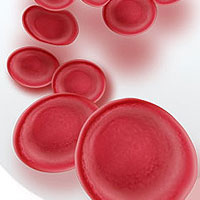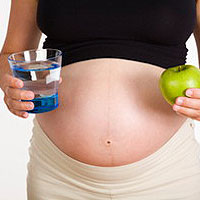| |
 |
|
| |
 |
|
| |
 |
|
| |
 |
|
| |
 |
|
| |
|
|
| |
Anemia is caused due to failure of the bone marrow
to produce blood cells, including red and white blood cells as well as
platelets. Aplastic anemia frequently occurs without a known cause.
Known causes include exposure to chemicals (benzene, toluene in glues,
insecticides, solvents), drugs (chemotherapy, gold, seizure medications,
antibiotics, and others), viruses (HIV, Epstein-Barr), radiation, immune
conditions (systemic lupus erythematosus, rheumatoid arthritis),
pregnancy, paroxysmal nocturnal hemoglobinuria, and inherited disorders
(Fanconi's anemia).
|
|
| |

|
When blood cells dry out (dehydrate), the density of hemoglobin S within the cell increases, thereby speeding the sickling process. The higher the concentration of sickle hemoglobin and the more acidic the environment, the faster the sickle cell process.
|
|
|
|
|
|
| |
|
|
| |

|
A drop in athletic performance or a general
feeling of fatigue may indicate you are
suffering from anemia, a condition in which the
production and amount of your red blood cells is
below normal. Red blood cells which carry oxygen
from the lungs to muscle tissues and organs are
synthesized in the bone marrow. Each cell lives
for about 120 days in the circulation.
|
|
|
|

|
Anemia is one of the common conditions
affecting human being especially women around the world. In general anemia
is considered to be a condition characterized by lack of blood. But
medically anemia can be referred as a condition where the iron content or
hemoglobin of blood decreases below the normal level.
|
|
|
|
|

|
Anemia is a medical condition in which the
blood has a deficiency of red blood cells or of the hemoglobin these cells
need to carry oxygen. Nutritionists feel that blood nourishing herbs aid in
the absorption of iron as well as providing other benefits to the blood. And
with lower doses of iron, the unpleasant side effects can be avoided.
|
|
|
|
| |
|
|

|
Iron-deficiency anemia is the most widespread nutrient deficiency
in the world, affecting an estimated 2 billion people worldwide. Between
40 and 50 % of children under the age of 5 in the developing countries
are iron deficient and iron deficiency accounts upto 20% of all maternal
deaths. It also impairs immunity and reduces the physical and mental
capacities of people of all ages. Women, in general, have smaller stores
of iron than men and have increased loss through menstruation, placing
them at higher risk for anemia than men.
|
|
|
|

|
Anemia is the general name for a range of disorders affecting the Red
Blood Cells. In all types, of anemia there is a shortage of a chemical
called hemoglobin that carries the oxygen from the lungs to all parts of
the body via these cells. It is unusual in the body in that it contains
iron. Because a good supply of oxygen is so vital, anemia has widespread
effects, which differ between the different types of anemia. Anemia
affects many women at some time in their lives, but it is most common in
women who smoke, have heavy periods or an eating disorder such as
anorexia.
|
|
|
|

|
Adequate iron is essential for the formation of
healthy red blood cells, and for both fetal demands and the large
increase in maternal blood volume. Pregnant women should eat a range of
iron-rich foods in order to prevent an iron deficiency.
|
|
|
|

|
A biological support vitamin that assists
the functions of other essential nutrients, folic acid is indispensable
for the smooth metabolic activity of hundreds of biological processes in
human metabolism. Without this essential vitamin, we could succumb to
myriad illnesses and diseases.
|
|
|
|
|
|
|
|
|
|









